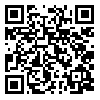BibTeX | RIS | EndNote | Medlars | ProCite | Reference Manager | RefWorks
Send citation to:
URL: http://jdisabilstud.org/article-1-709-en.html
2- Mazandaran University
3- Social Assistance and Crime Prevention Officers of Mazandaran Province, Department of Social Studies and Criminology
Abstract
Background & Objective: According to WHO Expert Committee on Drug Dependence, treatment refers to a process in which the person who has substance abuse disorder is put under contact with a care system or a physician or any social service and moves in an interceptive direction in order to achieve the highest welfare, health and public health level (WHO, 1998). The aim of present study was to compare the effect of treatment programs of mandatory residential canters versus rehabilitation camps on life satisfaction, emotion regulation and mental health in males with substance abuse disorder in Sari-Iran.
Methods: This is a two-group pretest-posttest quasi-experimental research. Convenience sampling was used to recruit 260 men with substance abuse disorder. The participants were randomly assigned to two groups in equal numbers, namely, those who were staying in mandatory residential centers, and those who were admitted to rehabilitation camps. One-way covariance (ANOCOVA) and analysis of multivariate variance (ANOVA) were used to analyze the data.
Results: The results showed that the both groups in the pre-intervention and post-intervention were significantly different (p<0.001) on life satisfaction, emotion regulation and mental health scales. The mean scores of life satisfaction scale in the participants who were admitted to the rehabilitation camps were higher than those in the mandatory compulsory treatment on all scales except for mental health and emotion regulation. The mean score of mental health of the participants in compulsory treatment was higher than those of the rehabilitation camps. Regarding emotion regulation, no tangible difference was observed in the two groups’ performance.
Conclusion: The results highlighted the fact that no method can be effective alone. Therefore, each method can have its practical implications in substance abuse interventions and preventive measures. It can also be concluded that the treatment programs regardless of the particular method of treatment, voluntarily or compulsorily, may merely help those understanding and identifying their own solutions for getting to change and develop with an intention to recover.
| Rights and permissions | |
 |
This work is licensed under a Creative Commons Attribution-NonCommercial 4.0 International License. |




